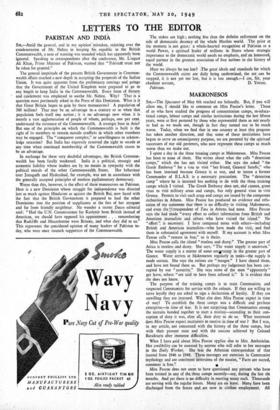LETTERS TO THE EDITOR
PAKISTAN AND INDIA
Sit,—Amid the general, and in my opinion mistaken, rejoicing over the condescension of Mr. Nehru in keeping his republic in the British Commonwealth, a note of warning was sounded which has apparently been ignored. Speaking to correspondents after the conference, Mr. Liaquat All Khan, Prime Minister of Pakistan, warned that " Pakistalf must not be taken for granted."
The general ineptitude of the presein British Government in Common- wealth affairs reached a new depth in accepting the proposals of the Indian Union. It was quite apparent from the preliminary comings and goings that the Government of the United Kingdom were prepared td go to any length to keep India in the Commonwealth. Every form of flattery and cajolement was employed to soothe Mr. Nehru. Why? That is a question most pertinently asked in the Press of this Dominion. What is it that Great Britain hopes to gain by these manoeuvres? A population. of 300 *million? That may be an advantage in.a century or so when that population feels itself one nation ; it is no advantage now when it is merely a vast agglomeration of people of whom, perhaps, one per cent. understand the existence of the Commonwealth. A strategic base in Asia? But one of the principles on. which the Commonwealth is built is the right of its members to remain outside conflicts in which other members may be engaged. Tihe " conquerer complex," or unwillingness to acknow- ledge secession? But India has expressly reserved the right to secede at any time when continued membership of the Commonwealth ceases to be an advantage.
In exchange for these very doubtful advantages, the British Common- wealth has been fatally weakened. India is a political, strategic and- economic liability whose leaders are by no means in sympathy with the political morals of the other Commonwealth • States. Her behaviour nver Junagadh and Hyderabad, for example, was not in accordance with the generally accepted principles of modern parliamentary democracy.
Worse than this, however, is the effect of these manoeuvres on Pakistan. Here is a new Dominion whose struggle for independence was directed just as much against Hinduism as against the British Raj, now faced with the fact that the British Government is prepared to lead the other Dominions into the position of supplicants at the feet of her arrogant and far from friendly neighbour. No wonder a recent Dawn editorial said: "Had the U.N. Commissioner for Kashmir -been British instead of American, we should have opposed his appointment . . . remembering that Radcliffe and Mountbatten were Britons, and what they did to us." This represents the considered- opinion of many leaders of Pakistan to- day, who were once staunch supporters of the Commonwealth. The stakes are high ; nothing less than the definite enlistment on the side of democratic decency of the whole Muslim world. The price at the moment is not great: a whole-hearted recognition of Pakistan as a world Power, a spiritual leader of millions in States whose strategic importance to the democratic world needs no emphasis, and an honoured, equal partner in the greatest association of free nations in the history of the world.
Must we always be too late? .The great ideals and standards for which the Commonwealth exists are daily being undermined, the rot can be stopped, it is not yet too late, but it is late enough.—I am, Sir, your










































 Previous page
Previous page